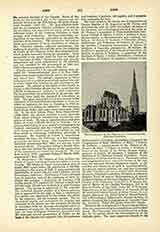

Lindanus (VAN LINDA), WILLIAM DAMASUS, Bishop of Ruremonde and of Ghent, b. at Dordrecht, in 1525; d. at Ghent, November 2, 1588; he was the son of Damasus van der Lint. He studied philosophy and theology at Louvain, and having during this time applied himself also to Greek and Hebrew, went to Paris to perfect himself in these languages. In 1552 he won the licentiate at Louvain, and the same year was ordained to the priesthood. Two years later, he was appointed professor of Sacred Scripture at the University of Dillingen. In 1556, he took the doctor’s degree at Louvain, and was appointed vicar-general to the Bishop of Utrecht and dean of the chapter at The Hague. Soon afterwards he became a royal counsellor and inquisitor in Friesland. In 1562, Philip II designated Lindanus for the newly erected See of Ruremonde, and the following year, on April 4, he was consecrated in Brussels by Granvelle. He was not, however, able to enter his diocese until May 11, 1569. Throughout the Low Countries the erection of this bishopric had caused displeasure, especially in the country of Guelders, of which Ruremonde was a part: where every act of the royal authority excited defiance. The heretics, moreover, were dissatisfied with the appointment of Lindanus, who was a staunch defender of the Faith. The new bishop began at once to reform his diocese, assisted in person at the Provincial Synods of Mechlin and of Louvain (1570, 1573) and carried out the laws and regulations of the Council of Trent.
In 1572, he was obliged to flee for several months from Ruremonde to the South of the Low Countries; on his return to his see, he defended vigorously the properties of the Church against the civil authorities. In 1573, a violent conflict broke out between himself and the Duke of Alba; and the heretics obliged him to flee on several Occasions. In 1578, he journeyed to Rome and to Madrid in order to obtain justice against the chapter of Maestricht, which had refused to execute the regulations concerning the episcopal endowment, as well as to confer with the Holy Father and the king upon the measures necessary for the safeguarding of the Faith in the Low Countries. Returning to Ruremonde, with the help of Philip II, he founded the royal seminary or college at Louvain, for the education of young clerics. Lindanus went to Rome again in 1584 to treat of the interests of his diocese and of the state of the Church in the Low Countries and in Germany, and he insisted particularly upon the urgent necessity of replying in a scientific way to the Centuriators of Magdeburg. His work in Ruremonde was now brought to a close by his elevation to the See of Ghent, where he began his new episcopal duties on July 22, 1588, and where three months later, he passed away. Among his numerous works the following are especially worthy of mention: “De optimo scripturas interpretandi genere” (Cologne, 1558); “Panoplia evangelica” (Cologne, 1560); “Stromatum libri III pro defensione Concilii Tridentini (Cologne, 1575); “Missa apostolica” (Antwerp, 1589), and in a more popular form, the dialogues, “Dubitantius” and “Ruwardius” (Cologne, 1562-3). He edited also the academic discourses of Ruard Tapperus (1577-78), and he wrote many works in Dutch for the instruction of his flock, in order to keep them from Protestantism and to refute the Confession of Antwerp of 1566.
H. DE JONGH

